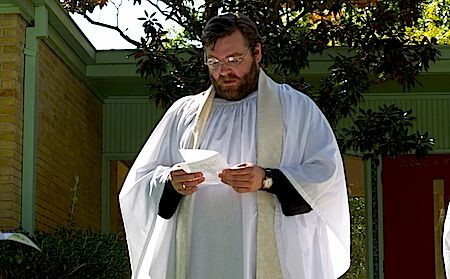Getting Ready for Sunday by the Rev. Paul Wheatley
Lucy looked along the beam and presently saw something in it. At first it looked like a cross, then it looked like an aeroplane, then it looked like a kite, and at last with a whirring of wings it was right overhead and was an albatross. It circled three times round the mast and then perched for an instant on the crest of the gilded dragon at the prow. It called out in a strong sweet voice what seemed to be words though no one understood them. After that it spread its wings, rose, and began to fly slowly ahead, bearing a little to starboard. Drinian steered after it not doubting that it offered good guidance. But no one except Lucy knew that as it circled the mast it had whispered to her, “Courage, dear heart,” and the voice, she felt sure, was Aslan’s, and with the voice a delicious smell breathed in her face. --C. S. Lewis, Voyage of the Dawn Treader.
“Courage, dear heart,” the voice of Azlan speaks to Lucy. Courage. Our readings for Proper 22 call us to courage, faith, and humility in response to the powerful grace of God.
In the Old Testament readings for both Track 1 and Track 2, we have prophetic responses to the violence of the Babylonians. Our Track 1 readings from Lamentations (and the alternate Psalm 137 with its violent imagery, longing for vengeance) respond to the destruction of Jerusalem by the Babylonians after its occurrence. “How lonely sits the city that once was full of people!” [Lamentations 1:1]. The Track 2 readings from Habbakuk and Psalm 37 address prayers to God in the midst of the violence against Jerusalem: “O Lord, how long shall I cry for help, and you will not listen? Or cry to you ‘Violence!’ and you will not save?” [Habbakuk 1:2].
Yet in all of these readings there remains unfailing hope, however distant its fulfillment may be, in the sovereign deliverance of the Lord. “But this I call to mind, and therefor I have hope: The steadfast love of the Lord never ceases, his mercies never come to an end; they are new every morning; great is your faithfulness” [Lamentations 3:21–23]. “Be still before the LORD * and wait patiently for him… Refrain from anger, leave rage alone; * do not fret yourself; it leads only to evil. For evildoers shall be cut off, * but those who wait upon the LORD shall possess the land” [Psalm 37:7, 9–10]. Even within the disturbing imagery of Psalm 137 lies hope that the LORD, not the Psalmist, will be the source of vindication: “Remember the day of Jerusalem, O LORD, against the people of Edom” [v. 7].
Hope like this takes courage, for it forsakes the opportunity to exact vengeance for one’s self. This is a suffering willfully chosen in the face of unwanted suffering all around: “[J]oin with me in suffering for the gospel, relying on the power of God, who saved us and called us with a holy calling, not according to our works but according to his own purpose and grace” [2 Tim. 1:8–9]. To choose suffering is not to invite it, but rather to be undeterred in the face of evil, relying on the power of God. As Catholic theologian Hans Urs von Balthasar puts it, “In that fight, to appear to be defeated with the Lamb is already a form of victory.”[1] Furthermore, to endure in this way does not result in pride of accomplishment, but, rather, recognition of God’s grace, not according to our works but according to his own purpose and grace.
This is the opposite of cowardice, the opposite of passivity. It is instead the faithful working of Christian hope, rooted in faith in a resurrected Messiah, given by the Holy Spirit: “God did not give us a spirit of cowardice, but rather a spirit of power and of love and of self-discipline” [2 Tim. 1:7]. It is for this reason that our Gospel reading speaks both to the need for us disciples to seek greater faith from the Giver of our faith: “The apostles said to the Lord, ‘Increase our faith!’” [Luke 17:5], and to the inappropriateness of pride in response to one’s own faithful service: “So you also, when you have done all that you were ordered to do, say, ‘We are worthless slaves; we have done only what we ought to have done!’” [Luke 17:10].
Our Gospel reading is preceded immediately by Jesus’ words about temptations, restoring fallen disciples, and above all our need to forgive in the face of repeated offense: “If the same person sins against you seven times a day, and turns back to you seven times and says, ‘I repent,’ you must forgive” [Luke 17:4]. When we are rightfully able to exact vengeance, and yet choose instead to forgive, we need faith, hope, love, and the power of the Holy Spirit more than ever!
In a day filled with protests against racial injustice, war in Syria and beyond, an increasingly politicized refugee crisis, economic instability, and the bitter rhetoric of presidential campaigns, we have many reasons why we may feel threatened and tempted to lose hope. Courage, dear heart! We do not hold the keys to the end of the story, but we can place our faith in the one who does. The Lord will come to judge the living and the dead, and his kingdom will have no end. Until then, we wait in faith and hope, waging works of God’s love with God’s power, in a spirit of self-discipline made possible by God’s work within us [2 Tim 1:7].
[1] Hans Urs von Balthasar, Light of the Word: Brief Reflections on the Sunday Readings, (San Francisco, CA: Ignatius, 1984), 352–353.
The Rev Paul D. Wheatley is the Vicar of St. Augustine’s, Oak Cliff



